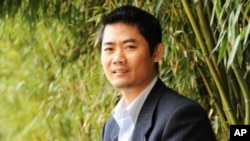Cambodian authors in the US meet at Harvard University today to discuss censorship and other issues facing Cambodia.
“We want to tell writers, journalists, and publishers in Cambodia that even though we are living overseas, we never stay quiet,” said Kho Tararith, writer and an organizer of the event. “We always think of those inside the country and we have been working together to improve this area. We won’t leave you in the cold.”
He and others will take part in a “Living Magazine” performance, where written works are acted out for an audience, on Tuesday night. The performance is part of the Visiting Writers Series at the university.
“It will have a kind of dual purpose, to educate and to expose and then also to speak on a more intimate level to people deeply familiar with this share experience,” said Jane Unrue, who runs the writers series and teaches at Harvard’s writing program.
The first Living Magazine was held two years ago and examined issues in Burma, China and Iran. This year, Cambodian participants also include poet Keo Chanbo, hip-hop artist PraCh Ly and writer Khoeun Samkhan.
The program supports writers with editorial input and helps them break from self-censorship and traditional styles.
“I mostly write for change,” Keo Chanbo said. “I write in a way where I can encourage people to try their best in life, not to be discouraged.”
She said she is often criticized for stepping away from tradition. There is a Cambodian expression that cautions ordinary people from “dreaming big,” but she thinks the opposite, she said.
“Over there, they don’t want us to speak the truth,” said PraCh Ly. “Some say it’s too dangerous. They are afraid people would do this or that. That’s why they don’t want people to talk back. They simply want to silence all voices.”
You Bo, the former president of the Cambodian Writers Association, in Phnom Penh, downplayed the significance of self-censorship.
“It certainly exists,” he said. “There are those who want to write about politics, but later say they are afraid. There are those who want to write about a certain issue but are afraid of touching high-ranking officials. It’s merely their own precaution.”




